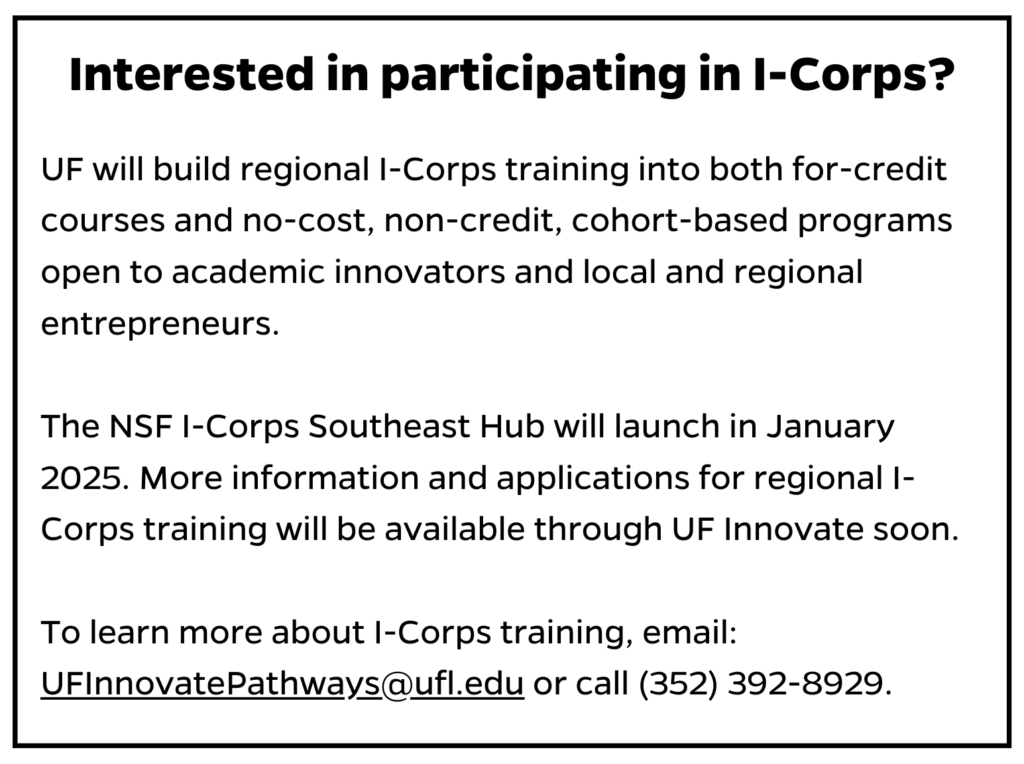UF Receives Funding to Expand NSF I-Corps Training to Accelerate Technology Translation and Strengthen the Regional Innovation Ecosystem
UF is a partner in a new Southeast Hub – a multi-state university consortium to train innovators and entrepreneurs
GAINESVILLE, FL – The University of Florida has been designated a partner in the National Science Foundation’s I-Corps Southeast Hub — a consortium of eight universities across four states receiving $15 million over 5 years to strengthen the innovation ecosystem in the Southeast.
Scientists, engineers, and entrepreneurs from UF and across the region will have access to proven customer discovery and entrepreneurial training to de-risk technologies and reduce the time to take research discoveries to market.
“NSF I-Corps training will be a game changer for UF,” said UF Innovate leader Jim O’Connell, who will serve as the UF PI. “It will not only accelerate moving new innovations to market but also create new startups and jobs, train and inspire the next generation of entrepreneurs, and impact society and the economy in a positive way.”
Leading the Southeast Hub are Director Nakia Melecio, senior research faculty and principal at Georgia Tech-Venture Lab, and lead faculty and instructor Keith McGreggor, director of Georgia Tech-Venture Lab and professor of practice.
The Southeast Hub, led by Georgia Tech, will cover Georgia, Florida, Alabama, and South Carolina, and include Clemson University, Morehouse College, University of Alabama, University of Central Florida, University of South Florida, University of Miami, and the University of Florida.
As the Southeast Hub, these universities will leverage their collective strengths to expand access to capital, experienced entrepreneurs, industry mentors, and advisors to better serve researchers. The Hub will implement best practices and provide experiential training opportunities with expert guidance.
“My participation in the regional and national I-Corps programs changed the way I view the products of research and helped me understand the process of commercialization,” said UF faculty innovator Dr. Lily Elefteriadou, the Barbara Goldsby Distinguished Professor of Civil Engineering.
“I-Corps is an essential step for not only those interested in commercializing their invention, but also for anyone interested in focusing their research to respond to societal needs,” she said.
I-Corps at the University of Florida
UF Innovate will lead UF’s participation in Southeast Hub activities and implement the program at UF.
Anita Rao, program director of UF Innovate I Pathways, will serve as co-PI and program director managing UF I-Corps programs. As part of the Southeast Hub leadership team, Rao will lead the Hub institutional expansion efforts, engaging new regional institutions in I-Corps.
“Incorporating I-Corps training in our offerings will strengthen innovation and entrepreneurship at UF and in the region and enable researchers to extend their reach beyond the lab. This transformational training will help innovators explore the commercial potential of their innovations and increase their probability of getting funding and successfully developing solutions for unmet needs in the marketplace,” Rao said.
UF’s faculty lead will be Dr. Benjamin Lok, a professor in Computer and Information Science and Engineering (CISE) and the scientific co-founder of UF startup Shadow Health, a nursing simulation software company acquired by Elsevier. In this role, Lok will liaise with faculty leads across the Hub and serve as a I-Corps mentor and advocate to engage faculty, postdoc, staff, and student innovators at UF.
“For any researcher who’s ever wondered, ‘I wonder how I can take my work out of the lab?’ I-Corps is the first step in finding out how to get started,” Lok said.
Dr. Matias Kirst, professor of quantitative genetics in the UF/IFAS School of Forest, Fisheries, and Geomatics Sciences and the scientific co-founder of UF startup Rapid Genomics will serve as the lead I-Corps instructor at UF, teaching the I-Corps curriculum.
“NSF I-Corps is transformative for faculty who want to commercialize their inventions,” Kirst said. “I-Corps teaches them how to evaluate their market opportunity.”
UF’s Dr. David Vaillancourt, professor and chair in the Department of Applied Physiology & Kinesiology in UF’s College of Health & Human Performance, attended I-Corps training at another hub institution and spun out his startup.
“I-Corps was instrumental early on as a springboard to learning about all of the hurdles that we would need to cross in getting a research discovery to market,” Vaillancourt said.
I-Corps training is based on Steve Blank’s Lean Launchpad methodology course at Stanford University. Embraced by several federal funding agencies, I-Corps training creates a scalable model for translating research into real-world impact with societal benefits.
For more information on the NSF I-Corps Hubs program visit: https://content.govdelivery.com/accounts/USNSF/bulletins/3bf19ef

